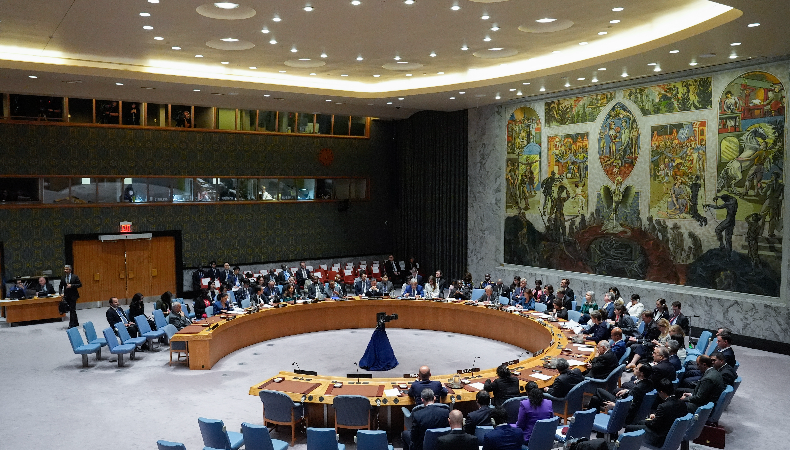Escalating Conflict Between Israel and Hezbollah: U.S. Calls for Implementation of U.N. Resolution

A White House official on Monday visiting Lebanon warned that among increasing clashes between Israel and the militant group Hezbollah, the violence has spiraled “out of control”. Advising the execution of a United Nations resolution concluding the last major war between the two parties in 2006, the U.S. diplomat Amos Hochstein, a special assistant to President Biden on the Israel-Hezbollah conflict, advised This visit to Beirut, the first since Israel launched a ground assault and escalated aerial assaults on Hezbollah, highlights the growing necessity of a solution as bloodshed gets more severe.
Israel’s most recent military action was started by months of cross-border rocket shooting from Hezbollah, a group tightly associated with Iran. Since then, the conflict has devastated Lebanon; the health ministry there recorded over 2,400 deaths in the past year alone and more than a fourth of the population uprooted. This violence has started a humanitarian disaster, compounding already difficult conditions in Lebanon.
Israel’s answer has been forceful, shifting lately from the military goals of Hezbollah to its financial basis. Targeting “dozens of facilities and sites” linked to Hezbollah’s finance activities, Overnight Strikes aims at Al-Qard al-Hasan, identified by Israeli and American authorities as the banking arm of Hezbollah. How many people died from these strikes is yet unknown. Al-Qard al-Hasan is registered in Lebanon as a charity and is essential to Hezbollah’s social services network, although Israel notes as a financial business affiliated with Hezbollah.
Israel Katz, the foreign minister of Israel, declared that Hezbollah would continue “paying a heavy price” for its activities against northern Israel. Reflecting the goal of the Israeli government to eradicate the group, Katz declared, “We will keep striking the Iranian proxy until it collapses.”
Hezbollah’s response is vigorous support of Hamas
Reacting to Israel’s military campaign with ongoing rocket and drone strikes, Hezbollah has claimed that these acts align with another militant group they back, Hamas. Hamas attacking Israel in October 2023 brought up a horrific Israeli military counteraction in Gaza. Changes in Hamas’s leadership were expected by U.S. officials to offer a window for negotiations, particularly with relation to the death of Hamas leader Yahya Sinwar in view of these growing attacks.
Still, despite these pledges, bloodshed has continued unabatedly; Hezbollah shows no sign of abdicating. While Amos Hochstein was in Beirut, Hezbollah fired more rockets toward northern Israel, suggesting that its pledges to heighten attacks—especially in view of Sinwar’s death—were being kept.
American Efforts to Cool the Conflict
The Biden government is very aware of the challenges the swift escalation of the conflict brings. Secretary of State Antony Blinken is scheduled to be traveling the Middle East this week in an effort to lower tensions and seek a truce for Gaza. Still, growing political unrest inside Israel itself complicates these projects. Some far-right Israeli politicians support the rebuilding of former colonies of Gaza that were devastated in 2005 in line with Israel’s departure. National security minister Itamar Ben-Gvir has openly addressed the possibility of renewing colonies in Gaza, an activity that would intensify already high tensions between Israel and the Palestinians.
Northern Israel’s situation remains delicate in the middle of these diplomatic campaigns. Israeli citizens still have to cope with rocket strikes from Hezbollah even with constant air raid sirens and rising sense of worry from arriving missile alerts. The response to this ongoing threat has been largely the recent installation of strong American missile defense systems to Israel, especially the Terminal High Altitude Area Defense (THAAD) system. U.S. defense sources underlined that this was the first time American soldiers had been dispatched to Israel to manage such modern defense equipment during the conflict.
The long shadow of U.N. resolved 1701
The foundation of U.S. diplomatic activity is a desire to carry out Resolution 1701 of the U.N. Security Council, which ended the last major conflict between Israel and Hezbollah in 2006. This resolution stipulated that the Lebanese military and U.N. peacekeepers be the only armed forces in southern Lebanon, thereby mainly failing to keep Hezbollah’s fighters and weapons out of the territory. Hochstein was candid in assessing the situation, saying that inadequate application of this resolution led to the current problem.
The application of Resolution 1701 would demand a significant shift in the power-balance in southern Lebanon. Given Hezbollah’s great impact in Lebanon both as a political organization and a terrorist group, the departure of Israeli forces and the disarming of the organization would be challenging to achieve. Hochstein’s remarks implied that Hezbollah’s disarmament and whole deployment of the Lebanese army are the only sensible means to avert future escalation and bring about long-lasting peace.
On the ground, however, the situation suggests this perhaps far-off aim as challenging. Hezbollah’s leadership has stayed overtly rebellious, threatening further strikes against Israel as long as the fighting in Gaza persists, even though Lebanese officials have claimed the party is ready to negotiate limits of the settlement and a cease-fire.
Uncertain Future
The conflict grinds on and there doesn’t seem to be any easy solution. Although the leadership of Hezbollah shows no sign of weakening, the Israeli government is nonetheless resolved to eliminate its military and financial base. The Biden government is still trying to slow down the violence and stop the war from engulfing a bigger territory. Still, the entrenchment of both sides and the disregard to follow international agreements like Resolution 1701 lead to a long and difficult road to peace.
“While we spent 11 months containing the conflict, we were not able to resolve it,” Hochstein says, which rings more strongly in Lebanon, where the humanitarian toll is increasing more severe daily. The stakes for Israel and Lebanon have never been bigger given with a fifth of the Lebanese population displaced and many more under risk. When both parties are digging in and the cost of escalation keeps growing as the world watches, diplomatic efforts can seem to be the last hope in a crisis.




